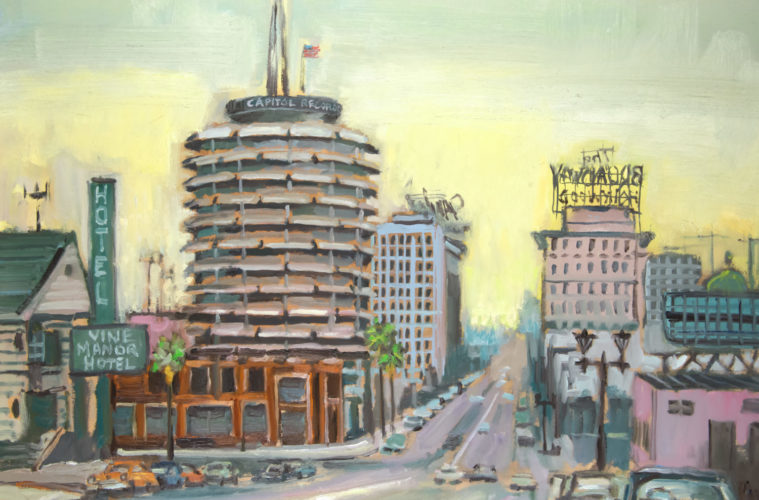Masterful paintings can transport us to places we’ve never seen, and to times we haven’t lived in. Artworks can also evoke fond memories, or nostalgia for pleasurable times when we enjoyed the company of friends in a variety of settings.
In this time of COVID-19, the exhibition, “Los Angeles Area Scene Paintings,” at the Hilbert Museum of California Art in Orange (to be installed through 2020) accomplishes all of the above. The show provides viewers with brightly-colored narrative scenes of people at play and at work in Los Angeles from 1913 to the present — with most oils, watercolors and gouaches executed during the mid 20th century.
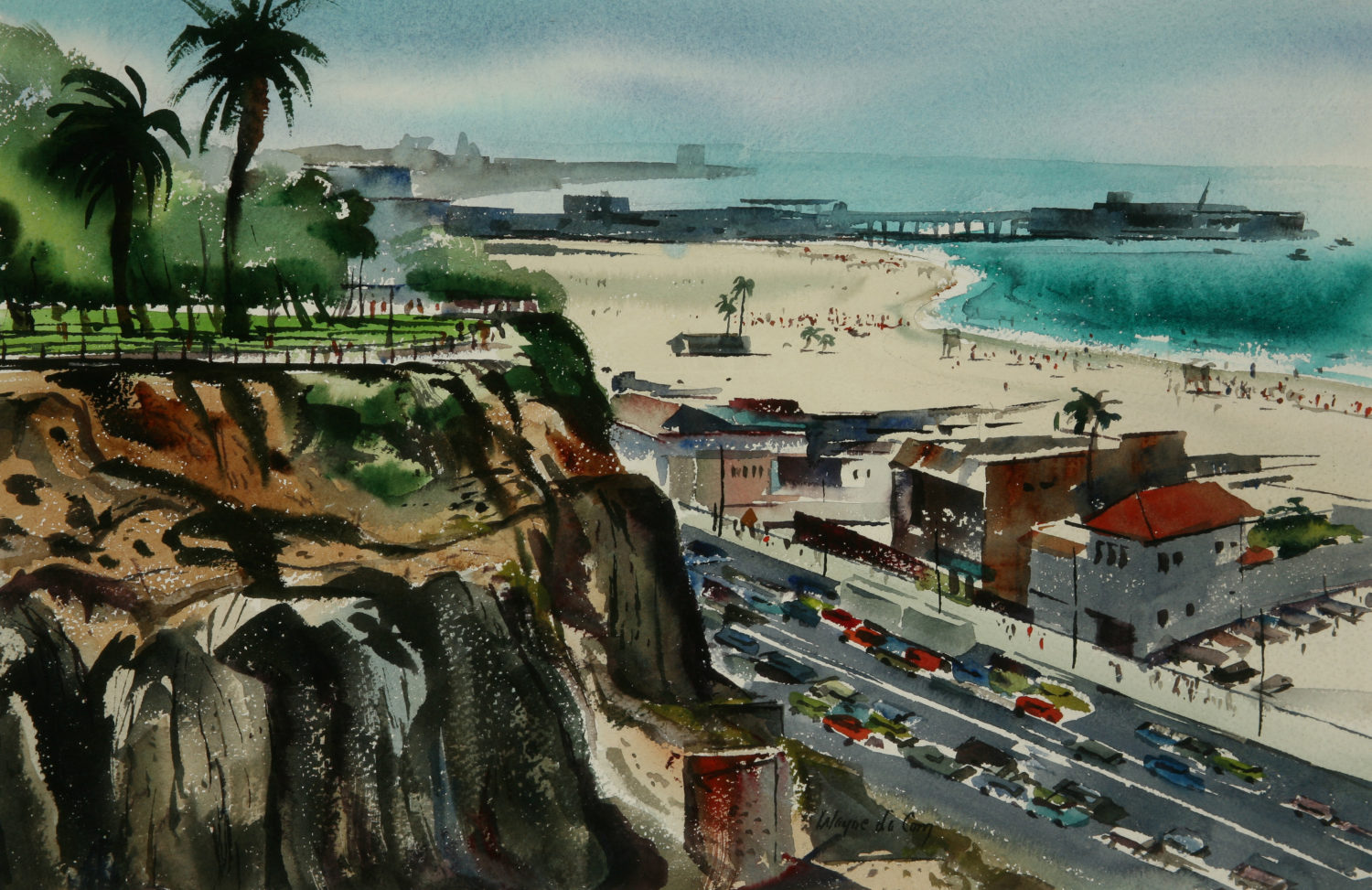
Wayne La Com, “Santa Monica Palisades,” 1958, watercolor on paper. The Hilbert Collection.
The paintings, employing representational, expressionistic and cubist influences, illustrate people in cities and towns, homes and harbors, beaches and parks and workplaces. They also depict landscapes, roadways, highways and even restaurants. As Mark Hilbert, co-founder (with his wife Jan) of the Hilbert Museum, explains, the early artists in the show were among the first group of native-born California painters. Many of them moved to Los Angeles to work in set design, backdrops, animation, poster design and advertising for film and animation studios, and they created their own paintings in their spare time.
The earliest work in this six-dozen painting exhibition is the gouache, watercolor and chalk “Looking Up Broadway, Los Angeles” (1913) by John W. Robinson. Illustrating L.A. nightlife in the years before prohibition, the painting features theater palaces, restaurants and retail stores lining a thoroughfare, as elegantly dressed pedestrians stroll alongside these attractions.
“China Town” (1933), a darkly colored oil painting by Paul Sample, is one of several pieces in this show referencing minorities. With a row of men lined up outside a Chinese establishment, it depicts a fund-raising effort to support an army in China.
One of the Hilbert Museum’s favored paintings is the 1934 oil “Mary by the Sea” by Lee Blair. This lovingly executed portrait illustrates the artist’s wife Mary on her lunchtime break, perusing a painting she is working on, with the fresh ocean breezes at her back. Mary Blair later designed the “It’s a Small World” ride at Disneyland.
A similarly bucolic painting is the 1939-42 “Sunday Afternoon in the Plaza de Los Angeles,” a large oil by Phil Dike. In the lush tree-filled scene of an L.A. plaza, hundreds of people sit on the many benches, or relax on the green grass. Some are returning from a day’s work, while others, such as a mother holding her baby, are enjoying the afternoon. This egalitarian scene, painted in the wake of World War II, takes the viewer to a simpler time.
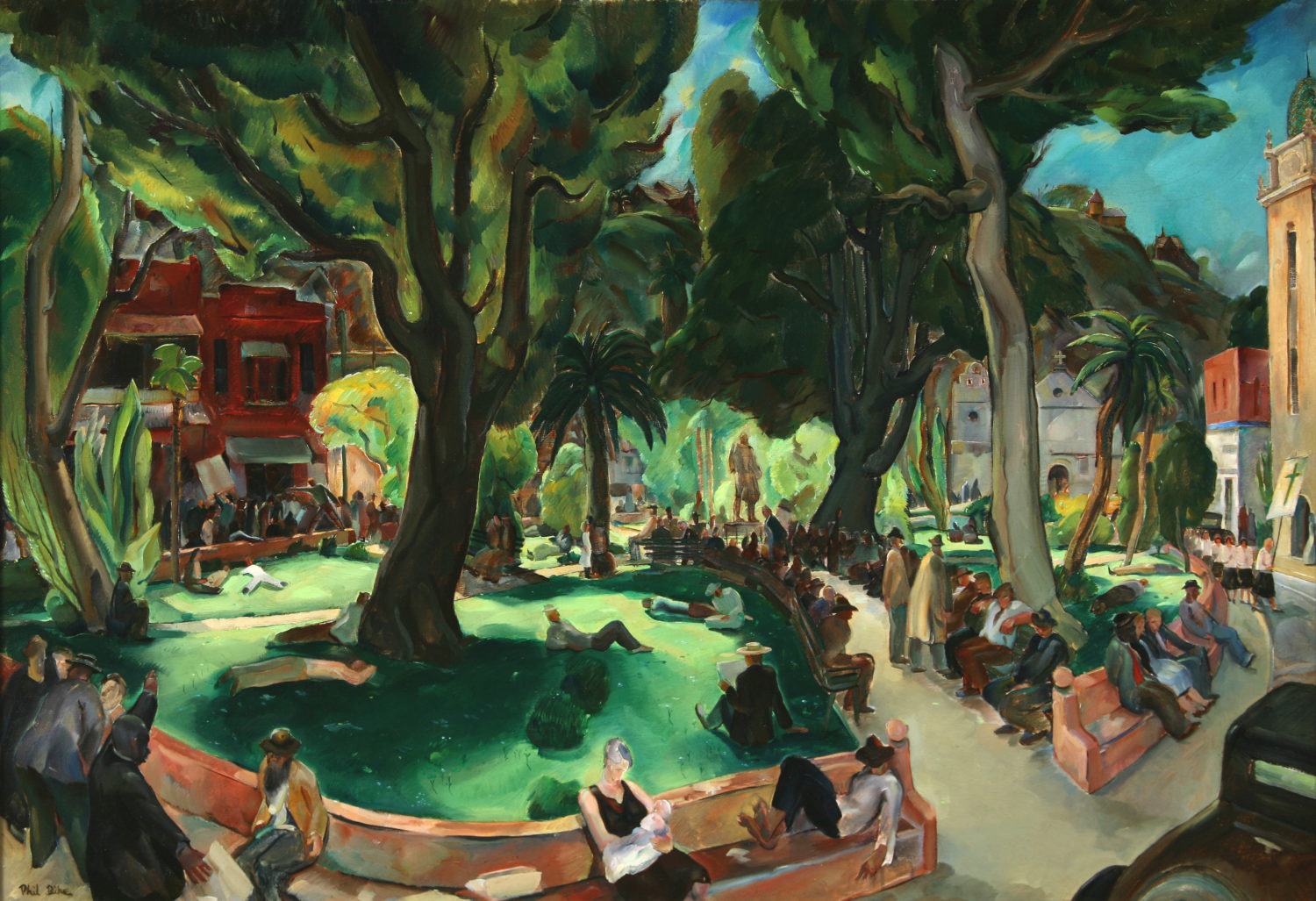
Phil Dike, “Sunday Afternoon in the Plaza de los Angeles,” 1939, oil on canvas. The Hilbert Collection.
A more somber oil painting is the 1937 “If I had the Wings of an Angel” by Barse Miller. This close-up of a carousel in L.A.’s Lincoln Park contains jubilant horses and riders, and rococo influenced architecture. Painted during the Great Depression, it contrasts people enjoying themselves with a brooding couple, in the front of the work, who are apparently undergoing difficult times.
The contrasting watercolor “Toonerville” (1946) by Dorothy Sklar is compelling, as it illustrates a small amusement park, funhouse and adjoining attractions in Santa Monica. The cartoonish drawing evokes childhood pleasures as well as a less complicated era.
Also evoking entertainment is Millard Sheets’ “Symphony Under the Stars (Hollywood Bowl)” (1956). Yet the watercolor is not only an overview of the Hollywood landmark, replete with musicians, conductor and audience. Now that the 2020 bowl summer season has been cancelled (on March 13, 2020), the painting evokes the recent time when music lovers were able to gather in throngs to hear classical music.
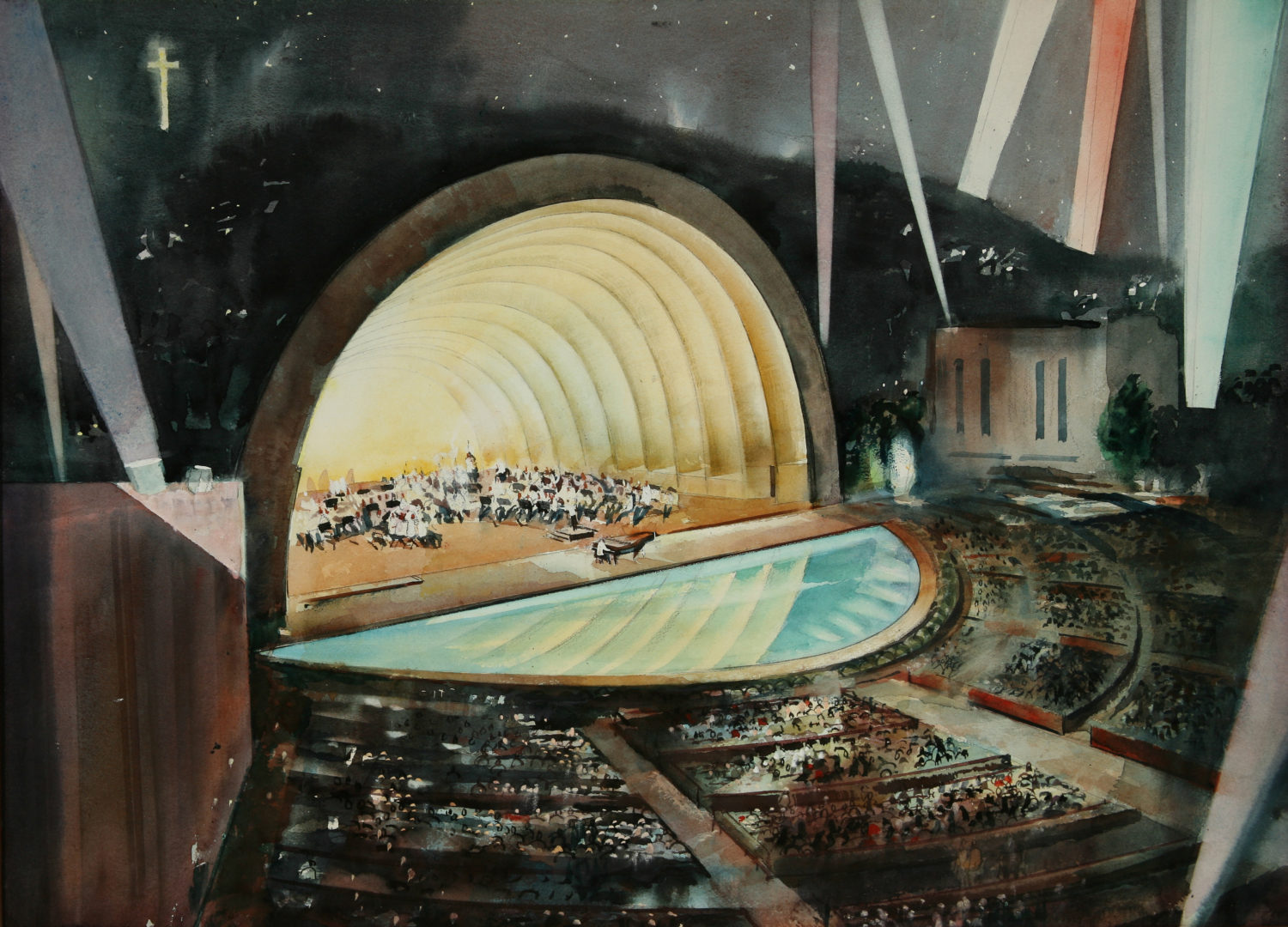
Millard Sheets, “Symphony Under the Stars (Hollywood Bowl),” 1956, watercolor on board, 20” x 30.” The Hilbert Collection.
Among the most abstract paintings in this show are Roger Kuntz oils, “Arches from the Freeway Series” (1961) and “Blimp Mooring” (1970). While devoid of people, they display the artist’s penchant to portray the SoCal landscape with bold shapes and light and shadows, and his expertise at adjoining both representative with abstract styles.
A more recent, socially conscious painting is “Domingo en Mi Barrio” (1993) by Sandow Birk. This representational painting in acrylic illustrates five young Latino men in a parking lot, surrounded by a convertible car, bicycles and various accoutrements expressing their penchant for fun.
The most recent paintings in this exhibition are “Canter’s Deli” (2012), an oil by Tony Peters, and “Eagle Rock Winter” (2014), an acrylic work by Suong Yangchareon. They display carefully executed photorealistic techniques to depict a restaurant exterior in the first piece, and the interior of a diner in the second work.

Suong Yangchareon, “Eagle Rock Winter,” 2014, acrylic on canvas. The Hilbert Collection.
The art genre, California Scene Paintings, of which this exhibition is a part, is a window into the past. The artworks call up a time when people all over our golden state enjoyed the beauty of our landscapes, while partaking in its many leisure and work-oriented opportunities. This show may be prescient, predicting a time when we can return to the lifestyles we enjoyed less than six months ago.
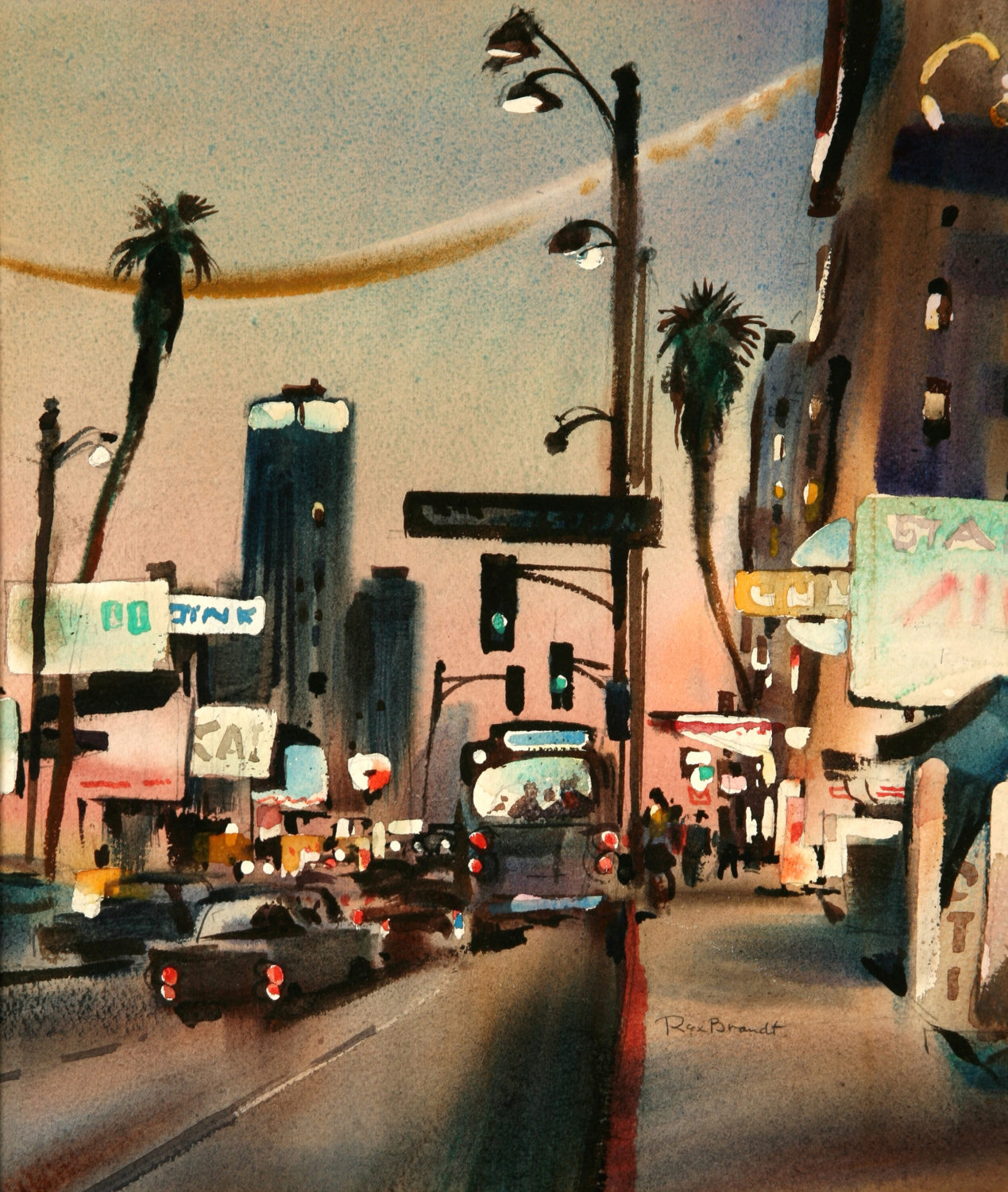
Rex Brandt, “Wilshire Boulevard,” c. 1960, watercolor on paper. The Hilbert Collection. (possible cover?)
While “Los Angeles Area Scene Paintings” is currently under quarantine, a 144-page catalog, with all paintings in the show, along with many others, is distributed by Sierra Vista Publications. It can be ordered at [email protected].
Hilbert Museum of California Art at Chapman University
167 N. Atchison Street
Orange, CA 92866
Phone: 714-516-5880
http://www.hilbertmuseum.com
Currently closed due to Covid-19
Advertising disclosure: We may receive compensation for some of the links in our stories. Thank you for supporting Irvine Weekly and our advertisers.

